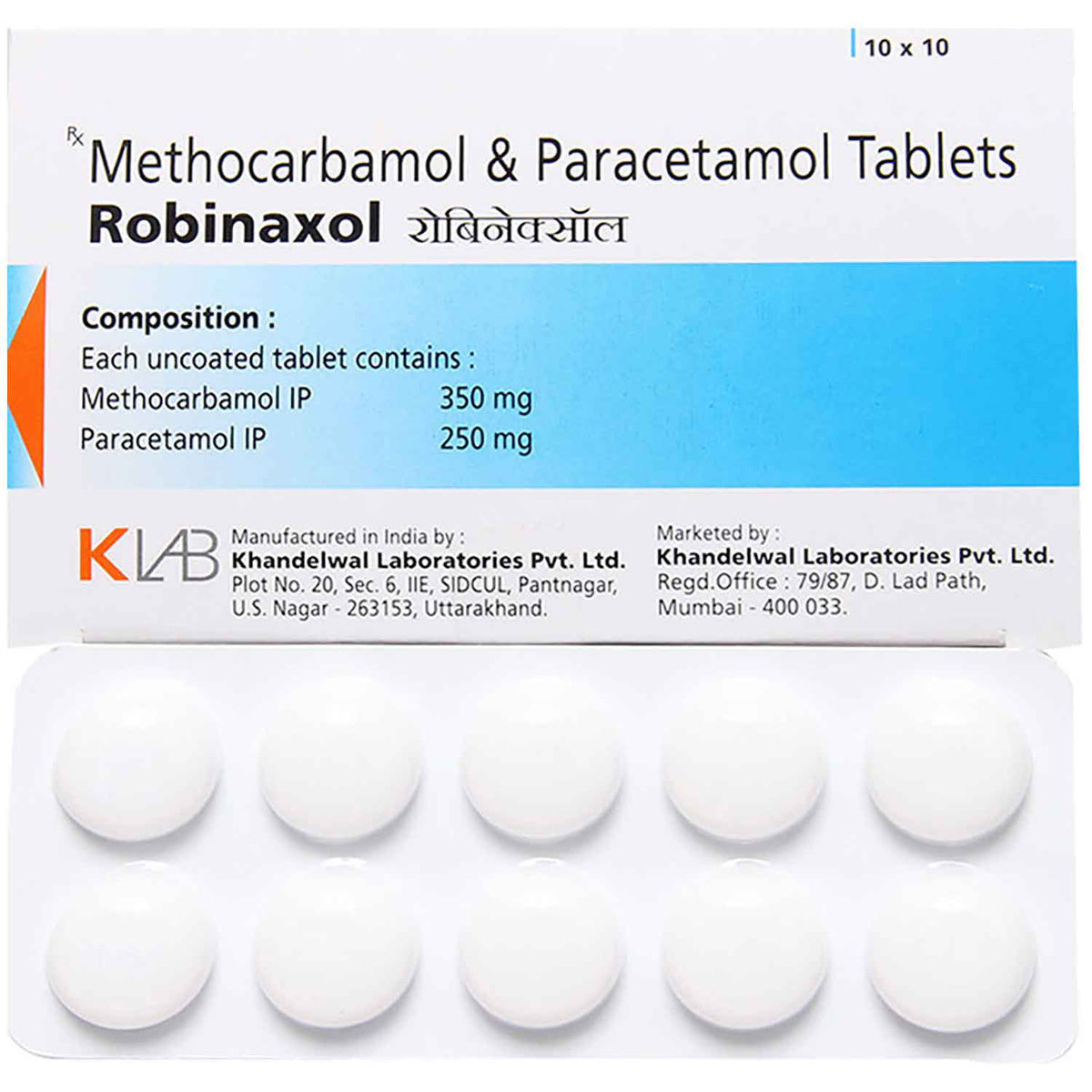Paracetamol+methocarbamol
About Paracetamol+methocarbamol
Paracetamol+methocarbamol belongs to the group of medicines called 'muscle relaxants' used to reduce and relieve muscle spasms due to pain and injury. Besides this, it also treats tetanus conditions (lockjaw) which are characterized by painful tightening muscles. Muscle spasm is the sudden, painful, involuntary muscle contractions which occurs when the nerve impulses that control the muscle movements are damaged or interrupted. Tetanus is a nervous system disorder leading to painful muscle contraction, mainly affecting the jaw and neck muscles.
Paracetamol+methocarbamol is a combination of two drugs: Paracetamol (mild analgesic and fever reducer) and Methocarbamol (muscle relaxant). Paracetamol acts as a mild analgesic and antipyretic, which inhibits the release of chemical mediators (prostaglandin) that cause pain, thereby lowering pain, inflammation and fever. On the other hand, Methocarbamol is a muscle relaxant that works by blocking pain sensation (nerve impulse) sent to the brain. Thus, Paracetamol+methocarbamol works on the central nervous system (spinal cord and brain), thereby maintaining muscle strength and relieving muscle spasms or stiffness.
Take Paracetamol+methocarbamol as prescribed by your doctor. Take Paracetamol+methocarbamol for as long as your doctor has prescribed it for you, depending on your medical condition. In some cases, you may experience certain common side effects, such as sleepiness, drowsiness, nausea, headache, weakness, and diarrhoea. Most of these side effects do not require medical attention and will resolve gradually over time. However, you are suggested to talk to your doctor if you experience these side effects persistently.
Continue taking Paracetamol+methocarbamol for as long as your doctor has prescribed it. Consult your doctor before taking Paracetamol+methocarbamol if you are pregnant or breastfeeding. Your doctor will prescribe Paracetamol+methocarbamol only if the benefits outweigh the risks. Paracetamol+methocarbamol is not recommended for children unless prescribed by a doctor. Inform your doctor about your current medicines and your health condition to rule out any unpleasant side effects. Do not take Paracetamol+methocarbamol with other drugs like antidepressants that make you sleepy or slow your breathing can cause dangerous side effects or death. Avoid intake of Paracetamol+methocarbamol in kidney disease conditions, seizures attack (fits/epilepsy) and muscle problems (myasthenia gravis).
Uses of Paracetamol+methocarbamol
Medicinal Benefits
Paracetamol+methocarbamol consists of two medicines: Paracetamol (mild analgesic) and Methocarbamol (muscle relaxant). Paracetamol acts as a mild analgesic and fever reducer, which prevents the release of chemical mediators (prostaglandin) that cause pain, inflammation and fever. On the other hand, Methocarbamol is a muscle relaxant that stops sending a pain signal to the brain, relieving muscle stiffness or muscle spasm along with pain and injury. Together, Paracetamol+methocarbamol treats painful muscle spasms associated with short-term muscle disorders, like spasms in the lower back, injuries, sprains and strains.
Directions for Use
Storage
Side Effects of Paracetamol+methocarbamol
- Nausea
- Vomiting
- Heartburn
- Stomach pain
- Diarrhea
- Loss of appetite
- Sleepiness
- Drowsiness
Patients Concern
Disease/Condition Glossary
Muscle spasm: The sudden involuntary contractions of the muscle can be painful and uncomfortable. When the nerve impulses that control the muscle movements are damaged or interrupted, it could lead to muscle spasms. Symptoms include muscle tightness, joint stiffness, unusual posture, difficulty moving, and pain in affected muscles and joints. Fatigue (weakness), stress, extreme heat or cold, infection, and tight clothing can trigger muscle spasms. Muscle relaxants and exercise can treat muscle spasms. Muscle relaxants sedate the muscle and help in inhibiting painful contractions. Exercise helps in muscle stretching, making them less likely to spasm, tear, and sprain.
Tetanus: Also known as Lockjaw, it is a bacterial infection caused by Clostridium tetani. After invading our bodies, these bacteria start to produce a poison (toxin) that causes painful muscle contractions. It causes a person’s neck or jaw muscles to lock, making it hard to open the mouth or swallow food/drinks.
FAQs
Paracetamol+methocarbamol belongs to the group of medicines called muscle relaxants which helps relieve pain and inflammation caused due to musculoskeletal injury and tetanus. Thus, it inhibits the pain reflexes at the spinal level and helps relieve pain and improve muscle movements. Paracetamol+methocarbamol also acts as a fever reducer by inhibiting the release of chemical mediators (prostaglandin) that causes fever.
Yes, Paracetamol+methocarbamol may cause drowsiness in some people. It is not necessary for everyone taking Paracetamol+methocarbamol to experience this side effect. Therefore, avoid driving if you feel drowsy after taking Paracetamol+methocarbamol.
No, Paracetamol+methocarbamol is not indicated for stomach pain. If you have stomach pain post-ingestion, it may be a sign of stomach ulcer or gastric bleeding. Do not take Paracetamol+methocarbamol in this condition. It is better to inform your doctor in case of stomach pain post-ingestion of this medication.
Paracetamol+methocarbamol is not safe to use in children, as its safety and efficacy have not been established. It is advisable to consult a doctor before giving any medicines to children below 16 years of age for tetanus.
Methocarbamol in Paracetamol+methocarbamol may interfere with laboratory tests. Please make sure your doctor and the laboratory staff know that you take Paracetamol+methocarbamol before undergoing any blood and urine examinations.
Overdose symptoms of Paracetamol+methocarbamol may include nausea (being sick), extreme drowsiness, fainting, seizure, or coma. If you experience any of these signs, immediately consult a doctor.




